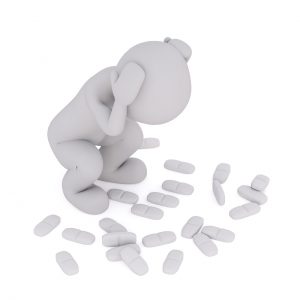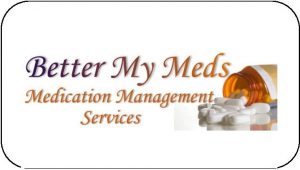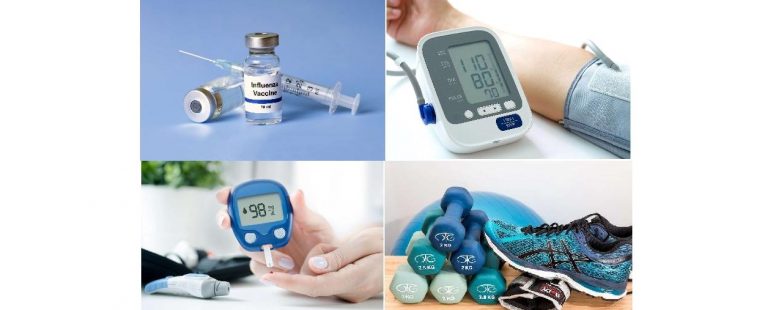Staying Healthy During the Next COVID-19 Surge
Betty Chaffee/ December 4, 2020/ COVID-19, Medication Management, Self management/ 8 comments
We are already doing so much to protect ourselves and others from COVID-19. We wear masks, we stay home, maintain distance when we're near others, wash our hands endlessly. Those are all effective ways to minimize the risk of catching and spreading the coronavirus. But the risk is still present. Let's talk about other things each of us can do to stay as healthy as possible even as the COVID-19 caseload increases.
The COVID-19 Vaccine
Vaccination against the novel coronavirus will be the best ammunition against COVID-19. But it's not available yet, and since FDA hasn't authorized its use there's little concrete information to share. Watch for a full-length post on the COVID-19 vaccine in the next week or two! For now we'll focus on other ways of staying healthy.
Stay up-to-date on routine vaccinations
Have you had your flu shot this year? What about your family members and friends? If you or someone you love has been putting it off, please get that task checked off as soon as possible! While the flu vaccine won't affect your chances of getting sick with COVID-19, protection from the seasonal outbreak of influenza will go a long way toward keeping you healthy as the winter progresses.
Same for the shingles vaccine, pneumonia, pertussis, hepatitis and others. If you're overdue for any vaccination, make an appointment with your pharmacist (or walk-in, whatever your pharmacy allows) and get yourself protected. All of these preventable diseases have the potential to land you in the hospital, which is exactly where you DON'T want to be (if you don't need to) during a COVID surge.
Keep chronic diseases under control
It's clear that those with certain underlying health problems are at higher risk of severe complications from COVID-19 than those who are otherwise healthy. If you smoke, or have COPD, diabetes, heart disease, obesity or certain other conditions, there are steps you can take to keep yourself as safe as possible.
If you smoke, consider cutting back or stopping altogether. There is support for smoking cessation out there, from suggestions on developing a plan to quit, to medications that decrease cravings. The healthier your lungs are, the more likely you are to avoid severe lung problems from COVID-19.
If you're under treatment for a chronic health problem, continue to follow the treatment plan you and your doctor agreed on. Know your goal blood sugar, A1C, blood pressure, or other indicator of disease control. If you're not meeting your goal, be sure to touch base with your doctor to adjust your treatment plan. Video appointments are available from most healthcare providers even during this COVID-19 surge. Don't delay! Keep your chronic conditions under the best control possible.
If you struggle with obesity, it's important to know your body mass index (BMI), since the risk of COVID-19 complications may go up as BMI increases. If you and your doctor talked about goals for nutrition and physical activity, continue to follow that plan.
Meet with your pharmacist for a medication review
BetterMyMeds is committed to providing patients with caring, one-on-one medication counseling (aka Medication Management). Our goal is to give you confidence that you're getting the best value from the medications you're taking.
The most common question I hear from patients is, "do I really need to keep taking all these medications?" Very often the answer is "no". Health problems and priorities change over time, as do treatment guidelines and knowledge about safety a nd efficacy of medicines. It's important to reassess the need for each medication at least annually. Since your doctor likely doesn't have the time needed to look critically at every medication, your pharmacist is the expert to turn to.
nd efficacy of medicines. It's important to reassess the need for each medication at least annually. Since your doctor likely doesn't have the time needed to look critically at every medication, your pharmacist is the expert to turn to.
At the same time it's important to take necessary medicines as they were prescribed. Especially now, since keeping chronic conditions under control can prevent doctor visits and hospitalizations. What if you just can't (or choose not to) consistently take your medications as prescribed? You're not alone, and there's no shame in that. There are many reasons for non-adherence to prescribed medications. That's always one of the topics discussed during a medication review, and there are almost always alternatives to try.
A medication review with your pharmacist will give you assurance that all your medications are doing their jobs to improve or maintain your health. If your pharmacist doesn't provide medication reviews, contact us at BetterMyMeds!
Give the gift of better health to someone you love
 Whether that "someone" is you, a family member, or a friend, now is a great time for giving! Gift cards for Medication Management services from BetterMyMeds are available now and year-round. We're currently offering a 10% discount on all appointments booked and gift cards purchased by 1/1/2021. (Use promotion code HOLIDAYS2020 when ordering a gift card online.) Contact us to schedule an appointment or ask a question.
Whether that "someone" is you, a family member, or a friend, now is a great time for giving! Gift cards for Medication Management services from BetterMyMeds are available now and year-round. We're currently offering a 10% discount on all appointments booked and gift cards purchased by 1/1/2021. (Use promotion code HOLIDAYS2020 when ordering a gift card online.) Contact us to schedule an appointment or ask a question.
And as always, we welcome your comments and questions in the space below!
![]()


I’ll be glad when the vaccine becomes available. I’m concerned about several things.
1. The steps that may be bypassed in order to push this through
2. I’m hearing the virus has mutated so I question the effectiveness when the vaccine becomes available.
3. How long before its available to the general population after “essential workers”
Great questions and valid concerns, Tony. I’ll share my thoughts with you, and hopefully Betty will, as well.
1. This certainly isn’t the first time that a medication or potential treatment has gone through expedition to receive approval. In certain situations when the need is considered urgent due to lack of other proven effective options, similar steps have been taken to accelerate approval. Having said that, I do realize that the trials for safety and efficacy have been more limited than most drug approval processes.
2. The short answer is, we don’t know. Part of the challenge of immunology is dealing with changes in pathogens (such as virus mutations) along with variations in our genetic traits that may influence how we respond to vaccines. This will likely take years before we are sure about how frequently these potential COVID-19 vaccines need to be administered (and recommended timelines for vaccine administration does occasionally change for other vaccines as well).
3. Right now, the limiting factor is the number of shots that will be available. My best educated guess is the vaccines will be more readily available for the public in Spring 2021.
Here is a link to the CDC website that offers additional information: https://www.cdc.gov/coronavirus/2019-ncov/vaccines/faq.html#:~:text=When%20a%20vaccine%20is%20authorized,until%20more%20studies%20are%20completed.
I hope you find this helpful. Thank you for your questions.
Tony,
You sure aren’t alone wondering all those things about COVID-19 vaccination. And thanks, Alan for your answers. The problem we have right now is that the research data are in the hands of FDA, and until they release their findings there isn’t enough information to answer most questions well. I’m planning to focus on the COVID-19 vaccination in my next article, as we expect an announcement from FDA in the next few days. I’ll be sure to address your questions, along with other common ones. If you have any other concerns or questions I can address in that upcoming article, shoot them my way!
Great article, Betty!
Many of us are experiencing COVID-19 fatigue. That coupled with all of the questions surrounding COVID-19 can make it easy to overlook the other steps we need to take to protect ourselves, not only from COVID-related complications, but other serious health issues such as uncontrolled blood pressure, impaired respiratory function, uncontrolled blood sugar, and others.
Thank you Alan and Betty for your take on this and also for providing the additional information link. I look forward to these articles
Pingback: COVID-19 Vaccination: Are You Eager or Hesitant? - BetterMyMeds
Betty, a friend has heard that there might be a possibility of the vaccine leaving a residue on the lungs that could be harmful. Do you know anything about that?
Thanks for bringing that up, Diane. I have not heard of that, but I’ll for sure look into it and address it in my next post about the COVID vaccine.